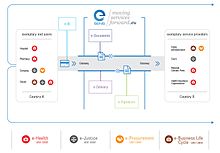Digital Single Market

The Digital Single Market is a policy belonging to the European Single Market that covers digital marketing, E-commerce and telecommunications.[1] It was announced in May 2015 by the Juncker Commission.[2]
Margrethe Vestager, a member of the European Commission, is responsible for the Digital Single Market as of 1 December 2019.
Strategy
The Digital Single Market is part of the Digital Agenda for Europe 2020 program of the EU, an initiative of Europe 2020 proposed strategy. It is defined by A Digital Single Market Strategy for Europe by the European Commission.[3]
The three said "pillars" of the European Commission strategy are:[4]
- Access to online products and services
- Conditions for digital networks and services to grow and thrive
- Growth of the European digital economy
These should address issues such as "reforming European copyright law" and "reviewing rules for audiovisual media", geo-blocking, cross-border sales, "reforming EU telecoms rules", "digital services' handling of personal data" and "building a data-driven economy".[4]
Implementation of this strategy was brought about with the introduction of the Directive on Copyright in the Digital Single Market, first released by the European Commission in September 2016, approved by the Parliament on 26 March 2019, by the Council of the European Union on 15 April 2019, and took effect on 6 June 2019.
EU roaming charges
EU roaming charges were a frustration for much of Europe's population for many years, particularly with an increased interest in data usage when travelling. Since 15 June 2017, members of the EU have been able to travel without roaming charges.[5]
Value
The European Digital Single Market would become one of the most valuable trade markets in the world for online businesses. The outgoing UK shoppers are estimated to have spent €153 billion online in 2016. During the same time, the US spent €363 billion online. Today, the EU online spend is valued at just under €500 billion, a figure expected to double by 2020 should the EU Digital Single Market be a success.[6] According to the Juncker Commission, a fully functional Digital Single Market could contribute €415 billion per year to the EU economy.[5]
See also
- eIDAS
- European High-Performance Computing Joint Undertaking
- European Union roaming regulations
- ePrivacy Regulation (European Union)
- General Data Protection Regulation
- European Travel Information and Authorisation System
- Internet tax
References
- ^ Ian Traynor. EU unveils plans to set up digital single market for online firms. The Guardian. 6 May 2015.
- ^ "Digital Single Market". Retrieved 17 June 2016.
- ^ A Digital Single Market Strategy for Europe. European Commission. 6 May 2015.
- ^ a b Digital single market for Europe. European Council
- ^ a b "European Commission – PRESS RELEASES – Press release – Digital Single Market: Commission calls for swift adoption of key proposals and maps out challenges ahead". Europa (web portal). Retrieved 11 May 2017.
- ^ Irish Online Economy Report 2016 (PDF). Dublin, Ireland: Wolfgang Digital. 2017. p. 11.
- Alberto De Franceschi (editor), European Contract Law and the Digital Single Market – The Implications of the Digital Revolution, Intersentia, Cambridge-Antwerp-Portland, 2016: http://intersentia.com/en/european-contract-law-and-the-digital-single-market.html
